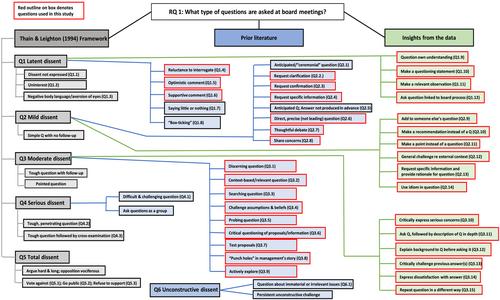Challenge in the boardroom: Director–manager question-and-answer interactions at board meetings
Abstract
Research question/issue
Corporate governance codes of practice require non-executive directors (NEDs) to challenge and question managers. Prior literature and best practice guidance remain silent on the precise meaning of, and on how directors might execute, “challenge”, and how management might respond. We explore the ways in which NEDs challenge, question, and dissent during board meetings, and how managers respond. We observe, audio-record, and video-record three boards during nine board meetings. Our boards are unique in holding part of their meetings in public and part in private.
Research findings/insights
Our dataset comprises 418 questions and 510 answers. We develop a typology of NEDs' challenge/questions comprising six categories/48 subcategories and managers' responses/answers comprising eight categories/69 subcategories. Our findings support the assertion that NEDs may be reluctant to offer moderate (i.e., constructive) challenge in public. We find significant differences between the level of dissent and the types of answers offered in public versus in private. We find an association between the type of question asked and the type of answer provided. Who asks and answers questions varies significantly in public versus in private, as do the questions and answers by each board.
Theoretical/academic implications
Our empirical findings suggest board behavior varies in the presence of an audience of stakeholders. In public, boards go through the motions by engaging in the performativity of governance, while more substantive governance occurs in private.
Practitioner/policy implications
We show that regulatory calls for robust challenge by NEDs have not been met, at least judging by the three boards in our study. There is a lack of guidance and advice on how NEDs should exercise challenge and how managers might respond.


 求助内容:
求助内容: 应助结果提醒方式:
应助结果提醒方式:


